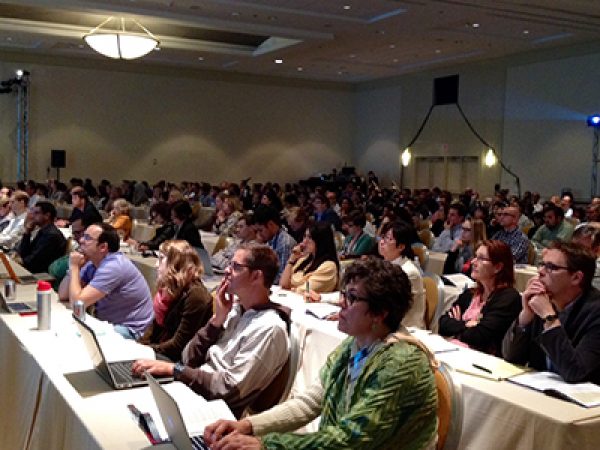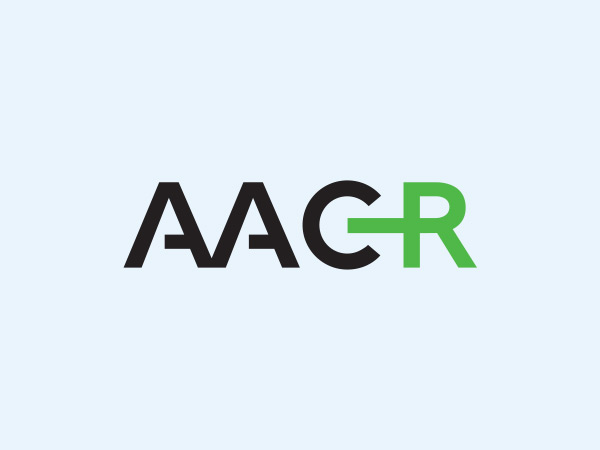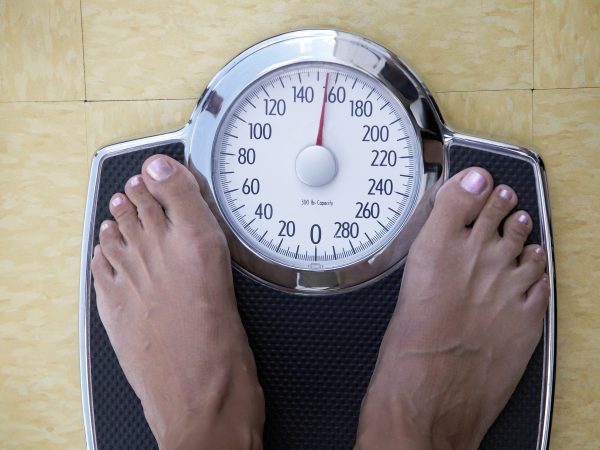Facing and Navigating Cancer/Enfrentando y Navegando el Cancer
Editor’s Note: Raquel Castellanos is assistant director of Scientific Programs at the American Association for Cancer Research. She and her husband, Alexander Gonzalez, graciously shared his experience receiving CAR T-cell therapy to treat lymphoma in this year’s AACR Cancer Progress Report. Here, Castellanos discusses her husband’s diagnosis and treatment in further detail, including her search for clinical trial data that could provide guidance on how Gonzalez might fare with his treatment. She provided her story in English and Spanish.
The words “Your husband has cancer” are some of the most difficult you will hear in your life.
On November 3, 2021, my husband, Alexander Gonzalez, went to the emergency room because he was having gastrointestinal issues. After a CT scan revealed massively enlarged abdominal lymph nodes, an oncologist stopped by to tell us that Alex most likely had lymphoma. Our world suddenly came crashing down and not only our heads, but our hearts, started spinning in a hundred different directions.
Being a scientist in this situation can seem like a blessing because you understand the science and know the questions to ask. But at the same time, you know what can go right, and you also know what can go wrong. I can recognize, though, that my background provided me with unbelievable privileges. I knew who to call, what tests to ask for and what they meant, and what specialists to seek out. I had a network to tap into to help with referrals. These are privileges that perhaps my fellow scientists can appreciate. There were also advantages that do not seem as obvious: I knew English and had a great health insurance plan.
Among the first people we called to share the diagnosis with were my parents. At the end of that call, I remember thanking them. Puzzled, my dad wondered why I would be thanking them. As a first-generation Chicana scientist, the advantages I noted above were acquired because of all of their sacrifices. They left Mexico and moved to New York City seeking the “American Dream,” far beyond the land where they were born, leaving everything behind and carrying with them an unending nostalgia for their home, a love and longing that I sometimes think was inherited by us, their children, in our own genetic makeup and that we carry in the pride we have for our culture. Our health insurance, through my position at the AACR, has essentially covered everything in Alex’s treatment. I can recognize that my educational background, fruit of my parents’ labor, has allowed me to achieve my professional goals, but also has allowed me to access world-class medical treatments.
It doesn’t mean it’s right, though. Everyone should have the right to access the best treatment possible. One thing that struck my husband and me was the way we were treated in the first emergency room we went to. A biopsy that could have been scheduled as an inpatient service was pushed off indefinitely, questions about pain went unacknowledged, and we felt a dumbfounding attitude of entitlement from the staff. We clearly knew we were not going to go through treatment there and began making phone calls, with colleagues also reaching out to doctors at Penn Medicine, which is where Alex was ultimately treated. We were so perplexed by the way we had been treated at the first hospital that I had to put in an official complaint. Had we been treated that way because we are Latino (Alex is Colombian)? Is it because that specific hospital was in an underserved neighborhood? Were other Latino patients being treated this way too? The unfortunate truth is that this happens all the time, and unless you know how to navigate the incredibly complex medical system, many are left on standby because they don’t know what questions to ask, they lack adequate health insurance, or they don’t speak fluent English.
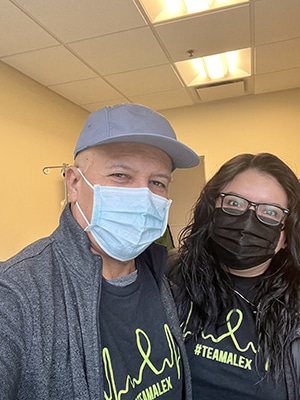
Going to Penn Medicine was truly a blessing. Alex’s oncology team is at one of the best hospitals in the world, and we are lucky to live only 30 minutes away. Penn was an easy choice for us, but whether it’s because of language barriers, job complexities, medical insurance issues and even legal status in this country, it’s a choice that’s inaccessible to many. We did not think twice about going to Penn for a second opinion, especially after recognizing that the way we were being treated in the first hospital was absurd. But what happens to the person who does not know that something is indeed wrong with how they are being treated and assumes that that is just the way things function?
As a wife, I wanted my husband to feel supported and wanted him to not suffer in pain. I also wanted to make sure that he was never treated with anything but respect, a sentiment that I probably still carry from my childhood, when I would accompany my parents to dozens of appointments to translate for them. It takes a tremendous amount of advocating on behalf of caregivers to ensure that only the best care is delivered to their loved one. Navigating the medical world is no easy task.
Alex’s official diagnosis after his biopsy was follicular lymphoma that had transformed to diffuse large B cell lymphoma (DLBCL). He immediately began six months of R-CHOP chemotherapy. Unfortunately, the follow-up PET scan after completing the chemotherapy treatment showed that his lymphoma was no longer responding and was therefore refractory. Tough news to hear when you know that about 80 percent of patients with DLBCL will respond to chemo. But his oncologist was already on it, planning the next steps.
Our faith has helped us tremendously during this time, and we truly believe that everything happens for a reason. Alex received his PET scan at the end of March. Just two days later, on April 1, the U.S. Food and Drug Administration approved Yescarta (axicabtagene ciloleucel) CAR T-cell therapy as a second-line regimen for DLBCL, meaning that Alex qualified for this potentially lifesaving treatment. His oncologist, Stefan Barta, MD, MS, was on top of things and knew the announcement was coming. He didn’t hesitate to line Alex up for CAR T immediately. And even this, we can recognize, is a privilege. The treatment alone can run close to half a million dollars, and our insurance covered it, making Alex one of only about 15,000 people in the world who have received CAR T.
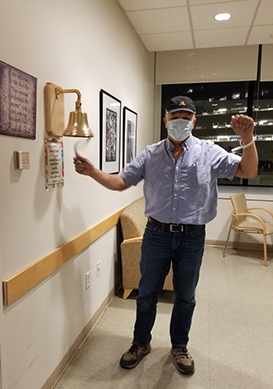
The good scientist that I am, I wanted to know how many Latino patients had participated in the Zuma trials that led to the FDA approval of Yescarta. It is a fact that diversity in clinical trials is still hard to come by. This is due to multiple factors. First, we need real strategic efforts to purposefully recruit underrepresented minority patients. Also, there is a painful history that makes patients from our communities reluctant to participate in clinical trials. As I researched the CAR T trials, I found that none had taken place in Latin America. The only two sites that perhaps we could extrapolate data from were Spain, due to the colonization of the Americas, and the United States, because of the diverse landscape, but no significant data was available on Latino patients.
I don’t think anything could have really prepared us for the experience of CAR T. We are so incredibly grateful that Alex was able to receive this lifesaving treatment. But the side effects are indeed very real, and quite different than those associated with chemotherapy or radiation. CAR T carries the risk of cytokine release syndrome (CRS) and immune effector cell-associated neurotoxicity syndrome (ICANS). Alex experienced fevers as high as 105 degrees for days, and neurological confusion that led to some scary episodes. But thankfully, we were at the place that developed CAR T, and had an unbelievable team taking care of him that knew what to expect and how to handle things. In that sense, it was an isolating experience. But at the same time, the outpouring of support from family, friends, and colleagues made our very heavy load a little bit lighter. Alex’s last PET scan, two months after CAR T, have shown that he is responding, with many of the lesions now gone. We have another scan scheduled for this fall, and our hope is that by then, everything will be clear.
For all the reasons above, Alex and I decided to share our story in this year’s AACR Cancer Progress Report. Our hope is that by sharing our experiences as a Latino couple going through a cancer diagnosis and treatment, we can make patients aware of what’s clinically available, and make health care providers understand the need to diversify clinical trials and treatments and to treat each patient with dignity and respect, regardless of whatever their educational, racial or economic background may be.
El cuento en Espanol
Escuchar las palabras “Tu esposos tiene cáncer” son de las más difíciles que escucharas en tu vida.
El pasado tres de Noviembre, mi esposo, Alexander González, fue a la sala de emergencias porque creíamos que tenia problemas gastrointestinales. Después de que una tomografía revelo que sus nódulos linfáticos en el abdomen estaban severamente agradados, en oncólogo nos notificó que Alex probablemente tenia linfoma. Nuestro mundo de repente se sacudió, y no solamente tu cabeza, sino que tu corazón empieza removerse en mil direcciones.
Ser científica en esta situación puede parecer una bendición porque conoces la ciencia y las preguntas que hacer. Pero al mismo tiempo, sabes lo que puede salir bien, y también lo que puede salir mal. Puedo reconocer que mi profesión me ha otorgado inmensos privilegios. Puedo llamar a colegas, conozco que estudios debo pedir y que es lo que indican, y que especialistas debo buscar. Tenia una red de otros científicos con quien consultar. Estos son privilegios que tal vez mis colegas científicos puedan reconocer y apreciar. Pero también teníamos ventajas que tal vez no son tan obvias. Sabemos el idioma inglés y tenemos un gran seguro médico.
De las primeras personas que llame con la noticia fue a mis padres. Y al final de esa llamada les di las gracias. Confundido, mi papa me pregunto que porque le agradecía. Como una científica Chicana, primera generación, las ventajas que tenía ante esta situación eran por los sacrificios que mis padres habían hecho. Sacrificios cuando dejaron su país natal, México, y se mudaron a la ciudad de Nueva York buscando “El Sueno Americano”, lejos de la tierra que los vio nacer, dejando todo atrás y cargando con ellos una nostalgia interminable por su hogar. Un amor y añoranza que a veces creo que nosotros sus hijos heredamos en nuestro propio ADN y llevamos con orgullos en el amor a nuestra cultura. Nuestro seguro médico, a través de mi posición en el AACR, nos ha cubierto básicamente todo los tratamientos médicos. Puedo reconocer, debo reconocer, que mi nivel académico, fruto del trabajo de mis padres y el apoyo de mi esposo, me han ayudado a alcanzar mis metas profesionales, y también me han ayudado a tener acceso a tratamientos uno de los mejores centros médicos en el mundo.
Pero eso no indica que las cosas deberían funcionar así. Toda persona debería de tener el derecho de tener acceso al mejor tratamiento disponible en su situación. Una cosa que nos llamó mucho la atención a Alex y a mi fue como fuimos tratados en la primer sala de emergencia que fuimos. Una biopsia que podría haberse hecho mientras estábamos en el hospital fue retrasada indefinidamente, hacia preguntas que no querían contestar, y nos encontramos con una actitud despectiva por el equipo medico que en realidad nos dejo confundidos. Teníamos seguro que iríamos a otro centro médico para los tratamientos y comenzamos a hacer llamadas, mientras mis colegas también hacían llamadas a Penn Medicine, que fue donde hemos sido atendidos. Pero nos inquietó tanto la forma en que fuimos atendidos en el primer hospital que tuve que poner una queja oficial. Acaso habíamos sido tratados así porque somos Latinos (yo Mexicana y Alex Colombiano)? Fue porque ese hospital estaba en un área con una población de bajos recursos? Acaso otros pacientes Latino eran tratados así en ese centro médico? La respuesta incomoda es que esto pasa todos el tiempo, y al menos que sepas como navegar el increíblemente complejo sistema médico, muchos son dejados al lado, sin atender, porque tal vez no saben que preguntas hacer, o no tienen un seguro médico, o tal vez no hablan inglés.
Ir a Penn Medicine ha sido una bendición. El equipo oncológico de Alex esta en uno de los mejores centros de medico en el mundo. Fue una decisión fácil para nosotros ir a Penn, pero hay muchos que tal vez por no hablar el idioma, complejidades con sus empleos, sus seguro médico, e incluso su estatus legal en este país, estos lugares serán inaccesibles para muchos. No lo pensamos dos veces ir a Penn, especialmente al reconocer que la forma en que fuimos tratados inicialmente era absurda. Pero qué pasa con la persona que no saben que esta forma de ser tratado esta mal, y asume que así funcionan las cosas?
Como esposa, quería mi esposo se sintiese apoyado y quería evitarle cualquier dolor. Al mismo tiempo quería asegurarme que el siempre fuese tratado con el máximo respeto, sentimiento que tal vez aun traigo conmigo desde mi niñez, cuando acompañaba a mis padres a decenas de citas medicas para traducirles. Cuidar de alguien requiere de abogar por sus necesidades para asegurarse que a su ser querido se le brinde solamente el mejor cuidado. Navegar el sistema medico no es nada fácil.
El diagnostico oficial de Alex después de la biopsia fue linfoma folicular que se había transformado a linfoma difuso de células b grandes (DLBCL). Inmediatamente comenzaron seis ciclos de quimioterapia llamada R-CHOP. Desafortunadamente, después de terminar la quimio, una tomografía mostro que el linfoma había dejado de responder al tratamiento, haciéndolo refractario. Difícil noticia escuchar cuando saber que aproximadamente el ochenta porciento de pacientes de DLBCL responderán a la quimio. Pero su oncólogo estaba muy al pendiente, ya listo para los siguientes pasos.
Nuestra fe nos ha ayudado tremendamente en este tiempo y creemos que todo pasa por alguna razón, aunque tal vez en esos momentos no lo entendamos. La tomografía de Alex había sido programada para el 30 de Marzo del 2022. La Administración de Drogas y Alimentos (FDA) aprobó Yescarta (axicabtagene ciloleucel), terapia celular CAR-T como segundo régimen para pacientes con DLBCL, haciendo a Alex elegible para este tratamiento que podría salvarle la vida. Su oncólogo, el doctor Stefan Barta, MD, MS, estaba mas que preparado y sabía que esta aprobación venia en camino, así que en seguido nos enlisto para recibir CAR-T. Hasta en esto, podemos reconocer es un privilegio y una gracia. El tratamiento puede costar cerca de un millón de dólares, pero nuestro seguro lo cubría, haciendo a Alex uno de los solos aproximadamente 15,000 pacientes en el mundo que han recibido CAR-T.
La buena científica que soy quería averiguar cuantos pacientes Latinos habían participado en los estudios clínicos ZUMA-7 que habían llevado a la aprobación de Yescarta. Es un hecho que aún es difícil encontrar estudios clínicos diversos. Esto por varias razones. Primero, necesitamos hacer un verdadero esfuerzo estratégico para reclutar pacientes de poblaciones minoritarias, de bajos recursos y áreas rurales. Al mismo tiempo, hay un historial doloroso que hacen que los pacientes de nuestras comunidades desconfíen de participar en estos estudios. Conforme analicé los estudios de CAR-T, descubrí que ningunos habían tomado lugar en Latino América. Los únicos dos sitios de donde tal vez podríamos extrapolar alguna información será de España, debido a la colonización de las Américas o de Estados Unidos, por la tremenda y bella diversidad que existe, pero no hubo suficiente información de pacientes Latinos en estas áreas.
Creo que no había nada que nos hubiese preparado para la experiencia de CAR-T. Estamos increíblemente agradecidos que Alex pudo recibir este tratamiento. Pero los efectos secundarios son muy reales y bastante diferentes a los que son asociados con quimio o radiación. CAR-T lleva el riesgo de desarrollar síndrome de liberación de citoquinas (CRS) y fuertes efectos neurológicas (ICANS). Hubo días en que Alex tenia fiebres de 105 F y confusión neurológica que llevo a algunos episodios bastante fuertes. Pero gracias a Dios, estábamos en el centro médico que desarrollo CAR-T con un equipo increíblemente preparado cuidándolo que sabían como manejar todo lo que se venia presentando. En ese sentido, esto ha sido una experiencia muy solitaria, porque al menos de que estes en el ojo de la tormenta, es difícil comprender lo que se esta viviendo. Pero al mismo tiempo, el apoyo de amigos, familiares y colegas ha sido desbordante y han ayudado a alivianar el peso de la situación. La última tomografía de Alex, dos meses después de CAR-T, ha mostrado que esta respondiendo, ya que muchas de las lesiones pequeñas han desaparecido. Tenemos otra tomografía este otoño, y nuestra esperanza es que para entonces, todo el linfoma haya desaparecido.
Por todas estas razones, Alex y yo decidimos contar nuestra historia en el Reporte de Progreso de Cancer (Cancer Progress Report) del AACR. Nuestra esperanza es que al compartir estas experiencias que hemos vivido como pareja Latina, atravesando un diagnóstico y tratamiento de cáncer, pueda informar a mas pacientes de lo que hay disponible, pero también hacer a los equipos médicos e investigación de que aún hay una necesidad muy real de diversificar los estudios clínicos, incrementar el acceso a nuevos tratamientos, y de también de tratar a cada paciente, sin importar so nivel educativo, su raza o su situación económica, con la misma dignidad y respeto.

